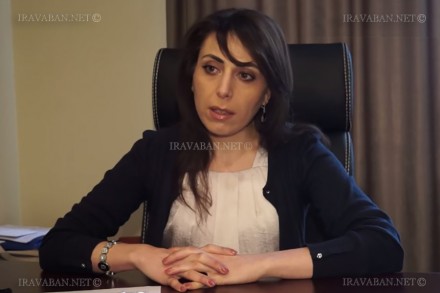By the 19th February decision of the RA Government the Anti-Corruption Council was created. Representatives of both CSOs and political parties are skeptical about its efficient activity. It is due to mention that only the “Prosperous Armenia” from the opposition factions of the NA has agreed to join the Council. Iravaban.net spoke with Haykuhi Harutyunyan, the President of the ““Protection of Rights without Borders” NGO, about this structure, the activity of the Commission on Ethics of High-Ranking Officials of Armenia and the problems of fight against corruption in Armenia.
– Do you think that the newly formed Anti-Corruption Council will be able to fight against the rooted corruption in Armenia?
– First of all I would like to say that it has long been discussed whether it is the most proper model for making the fight against corruption more efficient. At last they stopped on the idea of the council. The council is a group of people, which must control the implementation of anti-corruption strategy. When the institutions introduce their works, it will check and confirm them. From the very beginning there are not great expectations that the council will make revolution in the fight against corruption.
The personnel of the council are a matter of concern. The anti-corruption strategy has been processed mainly by the Ministry of Justice, and then it has been sent to the Government for approval. It means that those who have created the anti-corruption strategy are involved in the same body, which will check whether the theses are implemented properly, are the results satisfactory or not. Can a person who represents interests of that institution check their own work? Even if we observe the ideal version that the person wants to work fairly and find out infringements, of course there is no confidence.
– It is also much spoken that the involvement of civil society in the personnel is very small, what do you think of it?
– After long debates the provision ensuring the involvement of representatives of two NGOs was left the same.. The involvement will be rotational. There will be a list of NGOs which will replace each other. Her the concerning factor is that let’s say one NGO has made observations during a year, but when it is time for assessment, this NGO is replaced by another NGO, which does not have enough information about the implemented activities and it is unknown how it may be assessed. On the other hand, the criteria of selection of the NGOs are also unknown, whether this number is responsible, whether it ensures the diversity: they have not even selected the NGOs according to the sphere, for instance NGOs competent in 4 spheres. (Let us note that 4 target spheres are chosen for the implementation of the primary implementation of the anti-corruption projects: education, health care, state revenue collection, police services – author). The personnel of the council, authorizations make us be skeptical about the results.
– One of the steps in the fight against corruption is criminalization of illicit enrichment, will you be for this legislative initiative?
– I am for the separate article in the Criminal Code about the criminalization of illicit enrichment, but I think that the norms of current legislation also allow revealing illicit enrichment. The publicized statements of the officials show that the amount of annual salary of the person is twice less than his income. The question is where he got that property from? The formulation in the legislation is not essential for the prosecutor to undertake definite steps. He must try to enact the norms of the current legislation. Anyway no article about illicit enrichment will make them initiate cases if there is no will to work.
– We gradually approach the issue of the Commission on Ethics of High-Ranking Officials. It is already two years that this institution operates. Are there any tangible results?
– According to the international experience the anti-corruption bodies must be interconnected in their activities and complete each other in order to ensure a result. We have an Ethics Commission which does not have enough authorizations for completing drawbacks such as illicit enrichment. It does not have an opportunity to send a request and find out what the reason for such a big difference in salary is. An institution which does not have authorization to receive information in order to go in its traces and make revelations will not have any result even if it works for 15 years. The commission still ensures only the acceptance of information, which we did not have in the past. At least now we know what income the officials have. Of course it is not a separate mechanism of fight against corruption: prevention is the important.
The commission does not even have authorization to examine a problem on his own initiative, without any applications from another person. This has been very much spoken about.
It also has limited resources. If I am not mistaken more than 700 statements from different persons are received. It is not serious to believe that 4-5 persons will be able analyze it all. There is not any opportunity to temporarily involve serious specialists either.
– Is the efficiency of these two institutions impugned also because they are not independent bodies?
– Of course. The Ethics Commission operates within the staff of the president and is financed by it. How can it be independent? No body must have any influence on it.
Interview: Astghik Karapetyan































